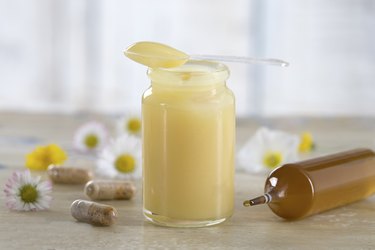
Royal jelly is substance produced by honeybees to serve as food for the queen bee, helping to make her larger and longer-lived than other bees. Whether consuming royal jelly benefits humans is still undetermined, as there haven't been sufficient clinical studies to prove health benefits. Royal jelly comes in several forms, but no matter which kind you consider taking, talk with your doctor first to make sure it's a safe supplement for you.
Potential Health Benefits
Video of the Day
Royal jelly may have antioxidant, antibacterial and anti-inflammatory effects, and may also help lower cholesterol and blood pressure levels, according to a review article published in the Journal of Functional Foods in January 2012. A small study published in the Journal of Nutritional Science and Vitaminology published in August 2007, found that taking royal jelly supplements for four weeks helped lower total and low-density lipoprotein, or "bad" cholesterol, levels by decreasing the amount of very-low-density lipoprotein in the blood.
Video of the Day
Hydrolyzed Royal Jelly Benefits
The type of royal jelly you take may affect how beneficial it is. A study published in the Journal of Medicinal Food in Fall 2006 noted that royal jelly hydrolyzed using enzymes has more antioxidant activity than regular royal jelly, making it more effective at limiting cell damage from free radicals.
Fresh vs. Frozen vs. Freeze-Dried
Freeze-dried royal jelly is shelf stable and maintains most of its benefits when stored at room temperature, so it's a good choice for people who don't use up their royal jelly quickly. A single dose of the resulting powder is quite small. When made into tablets or capsules, it's usually mixed with fillers.
If you're using nonfreeze-dried royal jelly, opt for one that has been frozen. A study published in the Journal of Proteome Research in August 2008 found that freezing helps better maintain the quality of the royal jelly compared to storing it at room temperature or refrigerating it.
Liquid formulations of royal jelly often contain preservatives and sometimes some honey to improve the flavor, so if you're trying to avoid preservatives these aren't the best choice.
Side Effects
Some people have experienced facial rashes, weight gain or gastrointestinal discomfort when using royal jelly. It may also increase your risk of hemorrhagic colitis, a condition that involves abdominal cramps, watery and bloody diarrhea and sometimes vomiting or a low-grade fever. In rats, consuming royal jelly for four weeks was found to affect reproductive function in males, but these effects stopped once the rats were no longer given royal jelly, according to the Memorial Sloan Kettering Cancer Center.
Potential Contraindications
People who are allergic to bees shouldn't take royal jelly, and those with other allergies may find they are allergic to royal jelly as well. Injections of royal jelly may be more likely to cause an allergic reaction than taking royal jelly orally.
Royal jelly may increase the effects of asthma, so people with asthma should speak to their doctors before taking royal jelly.
Since royal jelly may affect female hormonal activity, pregnant women and those with hormone-related cancers may want to refrain from using royal jelly.
Royal jelly may increase the effects of cholesterol-lowering medications and blood thinners, so people on these medications should avoid using royal jelly.
- Drugs.com: Royal Jelly
- Journal of Functional Foods: Bioactive Compounds and Health-Promoting Properties of Royal Jelly: A Review
- Journal of Medicinal Foods: Antioxidant Properties of Enzymatic Hydrolysates From Royal Jelly
- Memorial Sloan Kettering Cancer Center: Royal Jelly
- Journal of Nutritional Science and Vitaminology: Royal Jelly Supplementation Improves Lipoprotein Metabolism in Humans
- Journal of Proteome Research: Proteomics Analysis of Major Royal Jelly Protein Changes Under Different Storage Conditions
- Food and Agriculture Organization: Royal Jelly